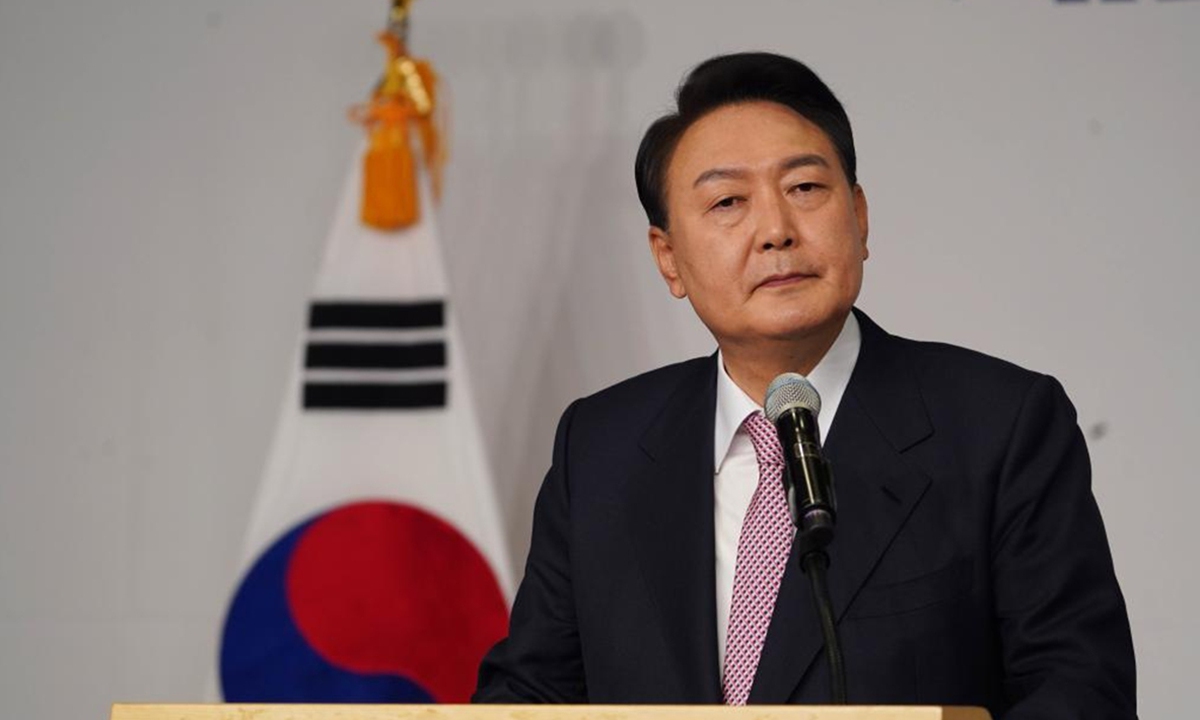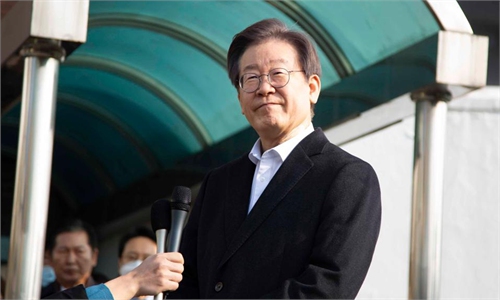
Yoon Suk-yeol Photo: Xinhua
South Korea's liberal opposition party won a landslide victory in the country's just concluded parliamentary elections, putting President Yoon Suk-yeol in a challenging position for remaining years of his term. The Democratic Party took 175 of the 300 seats in the new assembly, while the ruling People Power Party won 108 seats. Because of the election results, several high-ranking South Korean officials, including Prime Minister Han Duck-soo, submitted their resignations.
The choice of the South Korean people has sounded the alarm for the Yoon administration, which is facing a looming crisis.
According to Yonhap News Agency, despite the ruling party maintaining the necessary number of seats for the constitutional defense and dispelling concerns about possible impeachment of the president, Yoon's remaining three-year term in office will inevitably require a reassessment of governance direction.
The dissatisfaction of the South Korean people with the Yoon administration is due to both internal and external factors. Internally, Yoon has been embroiled in scandals, and South Korea's economy has been in a continuous decline, leading to a sense of helplessness among the people and doubts about the government's ability. The economic downturn is also linked to Yoon's foreign policy.
The Yoon administration has persistently pursued pro-American and pro-Japanese foreign policy while distancing itself from China. Since taking office, Yoon promoted a foreign policy based on ideology, disrupting the relatively balanced diplomatic relations maintained by previous administrations and causing a serious setback in China-South Korea relations.
Yoon's tilt toward the US has also harmed the interests of the South Korean people.
For example, in the economic field, South Korea sacrificed its own interests to comply with the US semiconductor export controls on China, resulting in significant losses. In this area, South Korea originally had very close cooperation with China, which also gave the former a huge trade surplus. However, since joining the Washington-proposed "Chip 4" alliance, South Korea has suffered huge losses, while the US continues to warn South Korea against filling the void left by the US in the Chinese market. China and South Korea find it difficult to have closer cooperation because of Yoon's foreign policy, which has worsened South Korea's trade and economic problems and made Yoon lose public support.
Besides, the Yoon administration often comments on questions related to Taiwan and the South China Sea, despite South Korea not being involved in those issues. As South Korea's opposition leader Lee Jae-myung asked, why is South Korea picking fights with China? What relevance does the Taiwan question have to South Korea?
In contrast, when faced with the issue of Japan's dumping of nuclear-contaminated wastewater, Yoon personally staged a show of eating seafood and did not take substantive action in response to widespread public protests.
If the previous protests by the South Korean people did not lead to any changes in the current ruling party, then the outcome of the parliamentary election is a warning bell for the Yoon administration. This situation is a true reflection of the extreme dissatisfaction over Yoon's past two-year presidency of South Korean people, who used their vote to express their hope that the opposition party can continue to restrain the Yoon administration and make some changes in the future.
From a diplomatic perspective, experts believe that because the president holds the biggest say in South Korea's diplomacy, the parliament still lacks effective ways to restrain the president's moves. Thus, even though the opposition party now has higher support than the ruling party, it may still not be able to restrain Yoon's foreign policy. Instead, it is possible Yoon may even lead the government to seek more "breakthroughs" in diplomacy and even more provocative measures against China, said the experts.
Seoul needs to understand that its domestic issues cannot be solved by treating Beijing as a competitor and diverting domestic attention. Hopefully the Yoon administration can learn from the lessons of the disastrous defeat in the parliamentary elections and adopt a more pragmatic diplomatic approach. Maintaining a balance of cooperation with the US and China is no harm to South Korea, said Zhan Debin, Deputy Chairman of the Shanghai Institute of Korean Studies in China.
Restoring peaceful and cooperative relations between China and South Korea is not difficult. Faced with such a disadvantageous position in domestic politics, South Korean leaders should formulate foreign policies based on the interests of the South Korean people rather than blindly following hegemonic power. Judging from South Korea's current position in the international community, geopolitical factors, and other aspects, there is no reason for the country to adopt a hostile attitude toward China. In terms of how Yoon will navigate the next three years, we can only hope that he can truly hear the needs of the people.

